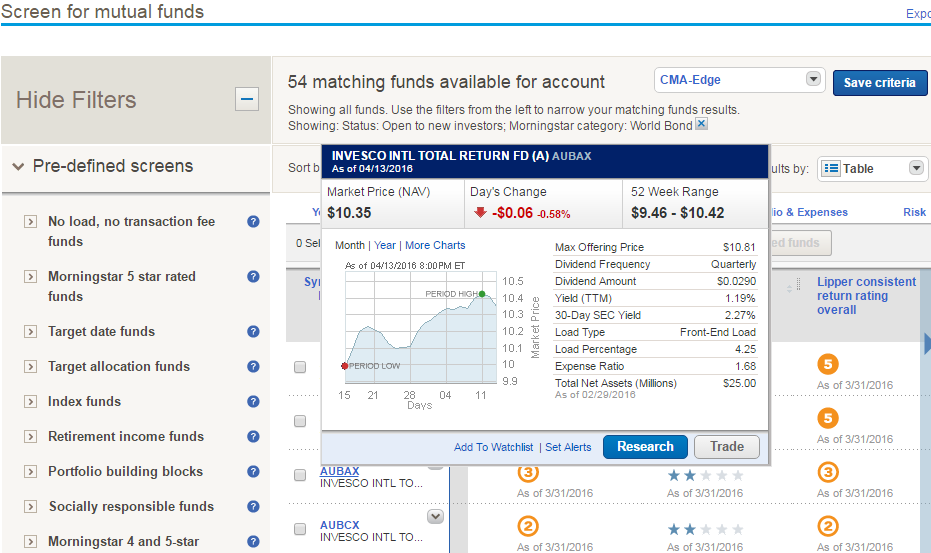Merrill Edge vs. Citi Introduction
Merrill Edge and Citi are two major players in the financial industry, each offering different value to investors. As many Wall Street firms are updating how clients trade in the 21st century, it’s essential to compare the offerings of these two significant banks to see which one stands out for investors.
Cost
| Broker Fees |
Stock/ETF
Commission |
Mutual Fund
Commission |
Options
Commission |
Maintenance
Fee |
Annual IRA
Fee |
|
Merrill Edge
|
$0
|
$19.99
|
$0.65 per contract
|
$0
|
$0
|
|
Citibank
|
$0
|
$0
|
na
|
$0
|
$0
|
|
Firstrade
|
$0
|
$0
|
$0
|
$0
|
$0
|
Services
Promotions
Firstrade: Get up to $250 ACAT rebate and $0 commission trades.
Merrill Edge: no promotion right now.
Citi: no promotion right now.
Merrill Edge
Merrill Edge, a subsidiary of the well-known Merrill Lynch, was designed for the everyday investor, particularly those with a net worth under $250,000. Merrill Edge is one of the top platforms available, catering to investors of all levels, from beginners to experts. It offers a wide range of account types, including CMA, Roth IRA, Traditional IRA, college planning, self-directed investing, guided investing, and more.
One of Merrill Edge's key attractions is its initial sign-up bonus, low commission fees, integrated research and analysis, access to financial advisors for clients with assets of $20,000 or more, and integration with Bank of America.
Clients with assets of $20,000 or more qualify for Bank of America's Preferred Rewards program, which offers additional perks when using Merrill Edge. They also benefit from $0 commission and trade fees.
The depth and quality of market insights and research available to Merrill Edge clients are impressive, offering the same level of information as Merrill Lynch clients who pay a premium for their service.

Merrill Edge Trading Tools
Bank of America and Merrill Lynch have invested heavily in technology, which sets them apart from other Wall Street firms. The Merrill Edge platform is straightforward and user-friendly, allowing trading via both mobile apps and desktop interfaces.

However, there are some differences between the two platforms. For example, to reinvest dividends, users must use the desktop version. Trading options are more limited on the app compared to the desktop, and charts are easier to read on the desktop version.
Merrill Edge Verdict
Merrill Edge is an excellent trading platform for anyone looking to invest. The integration with Bank of America, $0 trade fees, and access to financial advisors make it an attractive choice. Additionally, the user-friendly app and desktop interface make it easy for users to navigate and trade.
Citi Brokerage
Citi Brokerage is another option for investors. It offers similar account types as many other brokerages, including IRAs, college planning accounts, and cash accounts.
Citi Brokerage Trading Tools
The Citi platform, however, is not as strong and could benefit from significant updates or even a complete overhaul. It lags behind other brokers in terms of user-friendliness, mobile app options, and technical reliability, with frequent issues and delays.

Citi Cost
Unlike many other brokers, Citi charges a $4.95 trade fee. This is a significant disadvantage, especially since many other brokerages offer commission-free trading.
Problems
Citi also lacks a robust research database, making it harder for clients to access the market analysis needed for informed investment decisions. Additionally, many features must be accessed via the desktop site or by contacting the wealth management department directly.
Another major issue is the delay in trade execution. The system is often 15 minutes behind the current stock price and trades can be delayed by several minutes.
Citi brokerage also requires more capital than most firms to open an account, with a minimum investment of $50,000.
Moreover, to use strategies like margin trading or options, clients must contact the brokerage department. This includes setting up dividend reinvestment options, mutual fund sales, and margin trading.
These factors make Citi Brokerage a less desirable choice for investors, unless they already have a strong banking relationship with Citibank.
Citi vs Merrill Edge Verdict
When comparing the two, Merrill Edge clearly outperforms Citi Brokerage. Merrill Edge offers commission-free trading, a more integrated trading platform for both mobile and desktop, and superior market research and analysis. Both platforms provide good perks for clients with existing relationships, but Merrill Edge is a much better choice for investors at all levels.
Investors looking for the lowest commissions should take a look at Firstrade.
Promotions
Firstrade: Get up to $250 ACAT rebate and $0 commission trades.
Merrill Edge: no promotion right now.
Citi: no promotion right now.
|